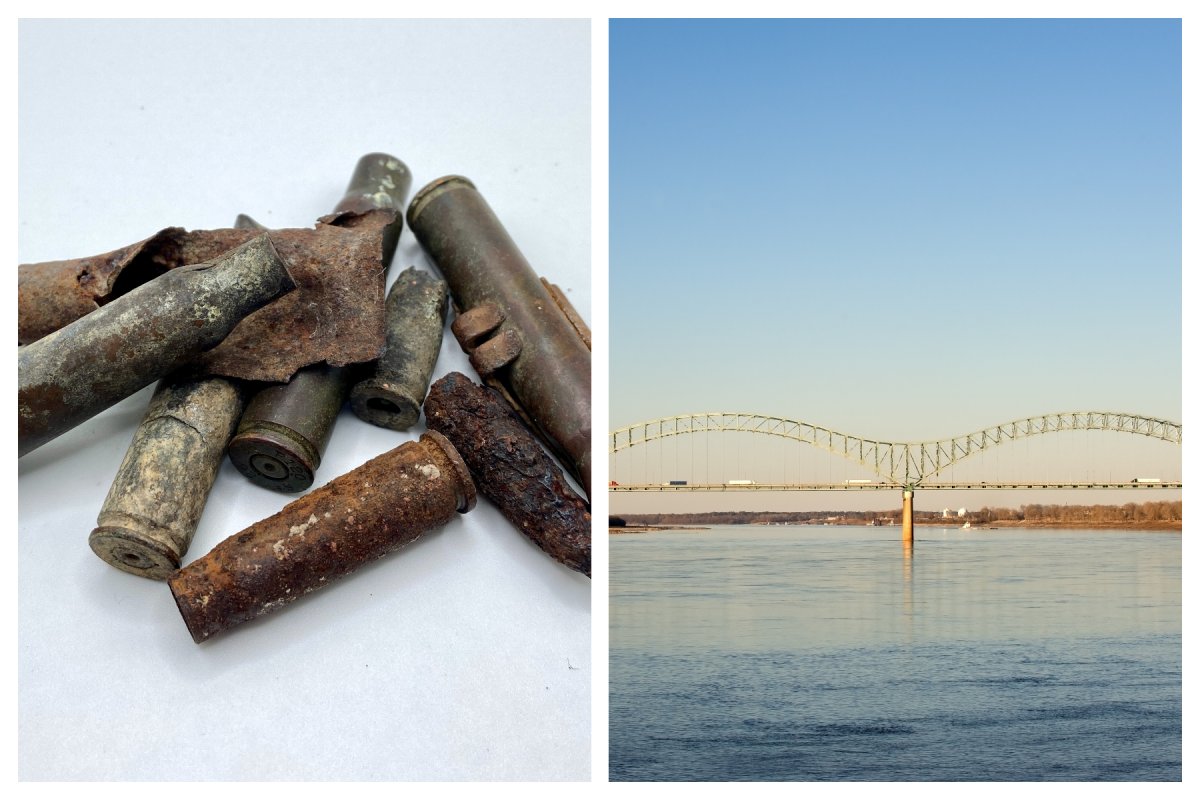Relics and artifacts from the American Civil War have been discovered laying on the banks of the Mississippi River due to its lower water levels caused by drought.
Riley Bryant, who goes by the username relic.riley online, shared videos of him discovering Civil War-era bullets and an entire intact belt buckle inscribed with the letters "US."
"I'm walking the riverbank here in Memphis, you can see the Bass Pro Pyramid, and all this stuff is just washed out," Bryant says in a video he posted to Instagram. "And look what I just found laying here, look at that! It's a Civil War belt buckle! Look, it's perfect shape."
The Mississippi River is the second-longest river in the U.S., running from Minnesota all the way to the Gulf of Mexico. The capture of the river by Union forces was a significant part of the U.S. Civil War, which waged between 1861 and 1865, due to its strategic position and importance to the Confederate side.
Like many other bodies of water in the U.S., the Mississippi River has faced declines in water levels due to the drought and heat waves facing the country this summer.
According to National Weather Service data, the river reached record lows in Memphis this week, with the water level dropping to minus-10.75 feet.

"Technically, metal degrades and corrodes over time in water, but if the artifacts are buried in the riverine mud and sediment they can be well preserved," Helen Farr, an associate archaeology professor at the University of Southampton in the U.K., told Newsweek.
"In rivers we find a mix of materials—sometimes from shipwrecks, sometimes lost artifacts, items thrown overboard, or thrown into the rivers, or material eroded from river banks that are then transported and mixed up.
"The river can transport all sorts of small artifacts, changes in river flow can erode and 'excavate' previously buried materials—or rebury them under transported sediment and mud- they are dynamic environments!
"As for other organic materials: wood, leather etc these are preserved best in either really arid or really wet conditions—the extremes! That's why underwater archaeology is so exciting," Farr said.
Bryant also shared a video on TikTok of him exploring some piles of ballast stones from cargo ships.
He also found more Civil War bullets, a glass bottle from the J.J. Heinrich Bottling company that bottled soda water in the 1880s, a meat hook likely used by a fishing boat in the 1800s, and an old oar lock for a rowboat, according to local news WREG Memphis.
@relic.riley excited to see what I find!! the river hasn't been this low since 1911! #Memphis #viral #exploring #fyp #metaldetecting
♬ original sound - Riley Bryant
According to Stacey L. Camp, an associate professor of anthropology at Michigan State University, federal law prohibits removal of artifacts from federal, state, and tribal lands.
"ARPA [Archaeological Resources Protection Act of 1979] violations can result in fines and/or imprisonment," she told Newsweek. "If someone encounters an artifact, they should contact the landowner and leave it in place so it can be documented. The context or what we call 'provenience' of an artifact is critical to understanding how it got there in the first place. Once it is removed from its context, it is harder to understand what series of events resulted in it its deposition at that location."
Other relics of times gone by have been uncovered due to unprecedentedly low water levels across the U.S. In the Missouri River, a steamboat that sank in the 1800s was revealed, while in Lake Mead, five sets of human remains have been found, one of which is suspected to have been murdered as it was found stuffed into a barrel.
Uncommon Knowledge
Newsweek is committed to challenging conventional wisdom and finding connections in the search for common ground.
Newsweek is committed to challenging conventional wisdom and finding connections in the search for common ground.
About the writer
Jess Thomson is a Newsweek Science Reporter based in London UK. Her focus is reporting on science, technology and healthcare. ... Read more
To read how Newsweek uses AI as a newsroom tool, Click here.








